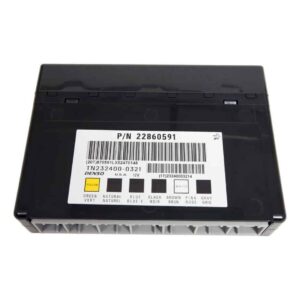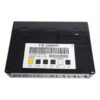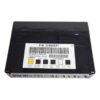Restore Full Functionality to Your GM Vehicle
Are you dealing with baffling electrical issues in your 2010 Chevy Tahoe or another compatible GM vehicle? Flickering lights, a dead instrument cluster, power windows with a mind of their own, or a security light that prevents your truck from starting are all classic signs of a failing Body Control Module (BCM). As the central hub for your vehicle’s comfort and convenience features, a faulty BCM can turn your reliable ride into a source of daily frustration. This isn’t just an inconvenience; it can affect vehicle security and safety systems.
This is a direct-fit replacement Body Control Module, arriving at your door fully programmed to your vehicle’s specific VIN. We load the latest GM-certified software before it ships, eliminating the need for an expensive trip to the dealership for programming. Simply provide your VIN after purchase, and we handle the complex part, making your repair as straightforward as possible.
Case Study: A Tricky Diagnosis
I remember a 2010 Tahoe that rolled into my bay last winter. The customer was fed up. His interior lights would stay on, draining the battery overnight, and the radio would randomly shut off. He’d already replaced the battery and checked the alternator. After hooking up my scan tool, I saw a dozen communication error codes (U-codes) pointing to a network failure. Instead of chasing ghosts, I went straight for the BCM, the network’s traffic controller. A quick swap with a VIN-programmed module like this one solved every single issue instantly. This part is often the root cause of those seemingly unrelated electronic gremlins.
Is Your GM Vehicle Showing These Signs?
A failing BCM can manifest in numerous ways. If you’re experiencing any of the following, it’s highly likely your BCM is the culprit:
- ✔ Power windows, locks, or mirrors operating erratically or not at all.
- ✔ Interior or exterior lights flickering, staying on, or not turning on.
- ✔ The security or anti-theft light is illuminated, causing a no-start condition.
- ✔ The instrument cluster gauges are behaving strangely or are completely dead.
- ✔ The radio or infotainment system is malfunctioning.
- ✔ Diagnostic trouble codes (DTCs) related to communication errors, such as U0100, U0140, or other U-codes.
- ✔ Key fobs are not working correctly.
Your Straightforward BCM Installation Guide
For the 2010 Tahoe, the BCM is located under the steering column. While the location varies on other models (see fitment list), the process is generally similar. This is a job most DIYers with basic tools can complete.
- Safety First: Disconnect the negative terminal from your vehicle’s battery to prevent any electrical shorts.
- Locate the BCM: On the Tahoe, this involves removing the lower dash panel beneath the steering wheel to gain access.
- Disconnect the Module: Carefully unplug all electrical connectors from the old BCM. The connectors have release tabs that must be pressed to be removed. Do not force them.
- Swap the Module: Remove the old BCM from its mounting bracket and install the new, pre-programmed module in its place.
- Reconnect and Reassemble: Plug all connectors firmly into the new BCM. You should hear a click. Reinstall any panels you removed and reconnect the negative battery terminal.
- Post-Installation Checks: Start the vehicle and test all body functions—lights, locks, windows, radio, etc. Note that some vehicles may require additional relearn procedures as detailed below.
Important Post-Installation Information
While we program the module for your VIN, certain vehicle systems may need to be re-synced after installation. This is a normal part of the process.
- Airbag System Sync: If your airbag warning light is on after the install, a professional scan tool is needed to perform the “Setup SDM Primary Key in BCM” procedure. This syncs the new BCM with the airbag system.
- Brake Pedal Position Relearn: On some models, a brake pedal position sensor relearn might be necessary to ensure correct operation of the brake lights and stability control systems.
- No Core Charge: You are not required to return your old module. This saves you time and the hassle of a core return.
Disclaimer: Always consult a factory service manual for procedures specific to your vehicle’s make and model.
Verified Compatibility for Your Vehicle
This BCM is a direct replacement for a wide range of General Motors vehicles and interchanges with numerous part numbers. Please verify your vehicle is on this list. This module replaces part numbers: 10382479, 15093910, 15276271, 15299986, 15819552, 15828601, 15837419, 15872388, 15872421, 15880684, 15921352, 15921353, 15948438, 15948439, 20815898, 20839063, 20864767, 20864768, 20921435, 20921436, 20935349, 22860591, 25826124, 25826125, 25847588, 25847589, 25892622, 25910474, 25934762, 25934763, 95151084.
Frequently Asked Questions
Frequently Asked Questions
What exactly does a Body Control Module do?
The BCM acts as the central computer for your vehicle’s body electronics. It controls non-engine related functions like power windows, locks, lights, wipers, security system, and the instrument cluster.
Is programming really included in the price?
Yes! We program the module with the latest GM software using the VIN you provide. This saves you from paying dealer programming fees, which can often be hundreds of dollars.
My original BCM has a different part number. Will this still work?
Most likely, yes. This module is a compatible replacement for a long list of original part numbers. Please check your number against the list provided in the description to ensure compatibility.
Do I have to send my old BCM back?
No. There is no core charge for this part. You can keep your original module, saving you the time and expense of shipping it back.
What tools do I need for the installation?
For most vehicles, including the 2010 Tahoe, you’ll only need basic hand tools like a socket set and a trim removal tool to access the module. No special electronic tools are needed for the physical installation.
What happens if my airbag light comes on after I install it?
This is an indication that the BCM needs to be synced with the airbag system (SDM). This requires a bi-directional scan tool to perform the ‘Setup SDM Primary Key in BCM’ procedure, which can be done by most professional repair shops.



